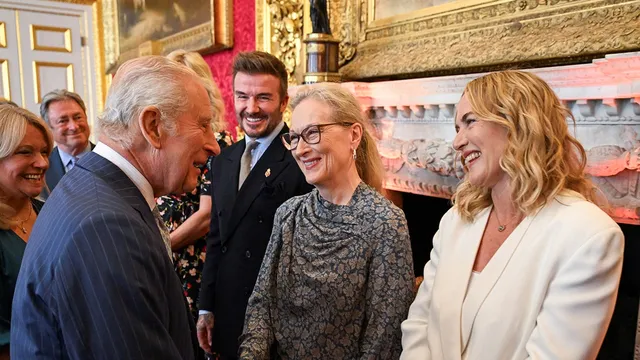
David Beckham set to receive knighthood from King Charles
2025-06-12 23:10- David Beckham's relationship with King Charles III has strengthened recently, particularly through shared interests.
- Beckham's forthcoming knighthood coincides with reported family tensions involving his son Brooklyn Beckham.
- Beckham's honor underscores his long-standing contributions to charity and loyalty to the monarchy.
Express your sentiment!
Insights
In the UK, David Beckham is on the verge of being knighted by King Charles III, following his growing relationship with the monarch, which has strengthened through their mutual interests in beekeeping and sustainability. Beckham's knighthood comes amid reported tensions within his family, particularly involving his eldest son, Brooklyn Beckham, and Brooklyn's wife, Nicola Peltz. While Beckham's honor highlights his contribution to various charitable causes, including his ambassadorship for UNICEF and his involvement in the King’s Foundation, the backdrop of familial conflicts mirrors similar estrangements within the British royal family, notably with Prince Harry seeking reconciliation with his estranged relatives. Beckham attended the King’s Foundation’s 35th anniversary ceremony, which celebrated contributions to sustainability, where noteworthy figures, such as Nobel laureate Muhammad Yunus, were also recognized. The event emphasized the ongoing initiatives aimed at ecological responsibility and community service, showcasing Beckham’s commitment to supporting the monarchy amidst personal controversies.
Contexts
Knighthood in the UK has a rich and complex history that dates back to the medieval period, when it emerged as a distinct social class and a code of chivalry. The origins of knighthood are traditionally linked to the rise of mounted warriors in the 9th century, where loyalty to a lord in exchange for land and protection became the foundation of feudal society. By the 12th century, the process of becoming a knight had become formalized, often involving a ceremony known as 'dubbing,' where a squire would be anointed as a knight by a noble figure, demonstrating a significance not just in military prowess but also in virtue, honor, and service. This established the knight as a key player in both warfare and local governance, tasked with upholding justice and protecting the realm. The medieval concept of knighthood was heavily influenced by the code of chivalry, which dictated the ethical and moral behavior expected of knights. This code emphasized virtues such as bravery, courtesy, honor, and great respect for women. The Arthurian legends and tales of knights such as Sir Lancelot and King Arthur played a crucial role in romanticizing the ideals of knighthood, further embedding these principles into the culture of the time. The societal expectations of knighthood were closely intertwined with the political framework, as knights were often landowners who participated actively in the governance of their regions, showcasing both martial and political loyalty to their sovereign. As England transitioned through the Renaissance and into the modern era, the nature of knighthood began to evolve. The rise of professional armies and a move away from feudalism diminished the military function of knights, but the honor associated with the title remained significant. The establishment of various orders of knighthood, such as the Order of the Garter in 1348, and other honors awarded by the monarchy, began to emphasize meritocratic ideals alongside historical tradition. Today, the knighthood is largely ceremonial, with individuals being knighted for contributions to society in various fields, from the arts and sciences to public service. The modern honor system in the UK has expanded to recognize a wider array of achievements, reflecting changing societal values. The significance of knighthood in contemporary British society lies not only in its heritage but also in its role as a symbol of national identity and continuity. Although the powers and responsibilities attributed to knights have diminished substantially, the act of conferring knighthood remains a prestigious event that continues to capture the public's imagination. The rituals and ceremonies involved in bestowing titles such as 'Sir' or 'Dame' maintain an air of historical grandeur that connects the present with the storied past of the British Isles. In essence, while knighthood has evolved from its martial roots into a recognition of personal achievement and service, it still embodies the legacy of honor, duty, and loyalty that knighthood has represented for centuries.